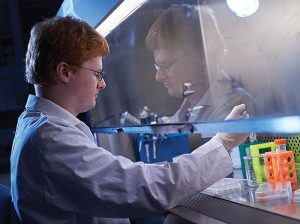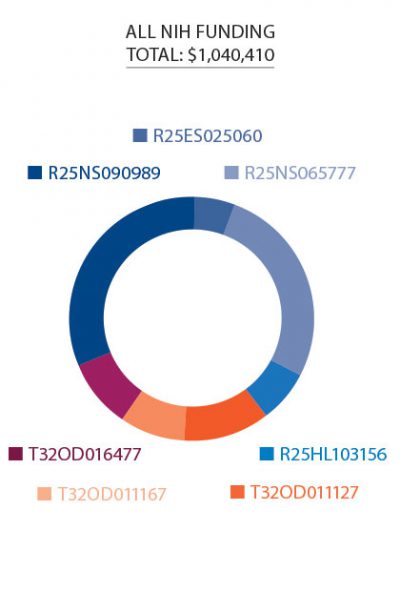
Innovative research at the MSU College of Veterinary leads to new understandings of basic science, new cures, and improved standards of care for animals and humans.

For more than 20 years, the College has been developing innovative research training programs that connect graduates and undergraduates to our rich biomedical research environments.
Dr. Vilma Yuzbasiyan- Gurkan, now Associate Dean for Research and Graduate Studies, and Dr. John Baker, now Dean of the College of Veterinary Medicine, were the driving forces in launching the College’s first student research programs.
“What adds to our history and makes our programs unique is the combination of support we receive from industry, government, and alumni to build the next generation of scientists, researchers, and practitioners,” said Yuzbasiyan- Gurkan.
Hypothesis-Driven Biomedical Research
Grants from the National Institutes of Health and the Merial Veterinary Scholars program, matched by College funds, support several summer research training programs.
“Students examine fundamental questions that let them see the implications for their research on diseases in animals and humans."
- Vilma Yuzbasiyan-Gurkan
The programs provide mentored research experiences in hypothesis-driven biomedical research. Accomplished researchers train students to fine-tune research skills, such as experimental design, data analysis, and writing.
At the end of the summer, students present their projects at the national Merial/NIH Veterinary Scholars Symposium. Here, they meet scientists from around the country and explore a range of careers and specializations.
Other mentored summer research programs are funded by the National Heart, Lung, and Blood Institute, the National Institute of Allergy and Infectious Diseases, the National Institute of Environmental Health Sciences, and the NIH Office of the Director of Research Infrastructure Programs.
The programs are built around some of the College’s areas of research excellence and provide students opportunities to work off-site in labs and with services through the USDA and MSU.
Enriching Veterinary Professions through Diversity

The College hosts a number of programs structured to enrich veterinary professions through diversity. One such program is the biomedical research training program for students underrepresented in the biomedical sciences.
Funded by the National Heart and Lung Institute, the program is offered to individuals with a specific intention to pursue an advanced degree after training.
The goal is to enhance career opportunities in biomedical sciences for individuals from populations that bear a disproportionate burden of poor cardiovascular health.
The program funds research in two primary areas: cardiovascular research (especially hypertension) and airway disease.
“Students involved in all of our training programs have a unique opportunity to see themselves as part of the bigger research enterprise,” Yuzbasiyan-Gurkan said. “These students become good candidates to participate in further training at MSU, and to embark on careers in research.”
Crystalizing Student Research Interests

Each year, more than 30 students from the MSU DVM program participate in research training programs that derive their strength from research-intensive faculty.
Areas of research include:
- Airway disease
- Cardiovascular
- Hypertension
- Infectious diseases and epidemiology
- Molecular genetics
- Neuroscience
- Toxicology
“We’re a leader in building programs that provide cutting-edge research training to and meet the global needs for both animal and human health,” Yuzbasiyan-Gurkan said. “Many students who complete the training come back and tell me they have a stronger sense of what they want to do, and how they want to contribute to society.”
Funding a Health Future
In addition to extramural funding, alumni and friends of the College support year-round veterinary scholarships.
- The Witter Fellowship
- Eskelund Fellowship
- A. Reddy Fellowship
- Feline Health and Well-being
Drs. Vilma Yuzbasiyan-Gurkan, William Atchison, Susan Ewart, and Lorraine Sordillo are key contributors to the training grants.
